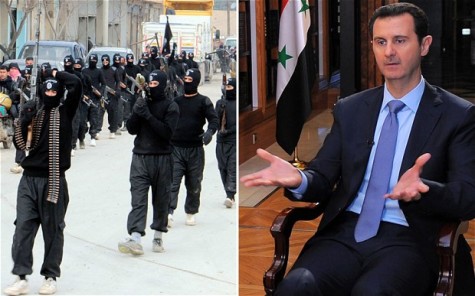Syria’s conflict was overtaken in headlines last week by the offensive threatening the Government in neighboring Iraq, as both the Assad regime and insurgents assessed the changed political and military context.
The gains by the Islamic State of Iraq and as-Sham in Iraq posed both challenge and opportunity for Syria’s insurgents, who have battling ISIS across the north and east of the country since January.
On the one hand, the capture by ISIS and other anti-Government fighters of Iraqi border posts and towns eased the movement of men, weapons, and supplies into Syria. Claims circulating of ISIS using Humvees taking in northern Iraq in operations against their Syrian opponents.
On the other, the escalating conflict in Iraq meant that ISIS had to pull some of its fighters back from Syria. The jihadists appear to be gambling that they can replace those men with recruits attracted to the group by its recent successes.
On ground in eastern Syria, ISIS captured the capture of villages along the Euphrates River, threatening to take the town of Mayadin.
The Iraqi crisis also posed complications for the Assad regime, which has welcomed ISIS’s challenge to insurgents. Assad’s ally Iran, a firm backer of the Iraqi government, may believe that a response to ISIS is necessary not only in Iraq but also in Syria.
Signs of a shift from Damascus came in airstrikes on ISIS positions in Raqqa, the largest city outside regime control, and in eastern Syria.
In a week of little movement on Syria’s battlefronts, news came of a possible breakthrough in Yarmouk in Damascus, besieged by the Syrian military since July. A reported cease-fire would finally allow significant aid into the area, where more than 15,000 people still live.
However, the Assad regime also put out a warning over humanitarian activity. Through Arab and Syrian lawyers, it warned that any attempt to bring aid across Syrian borders without its permission could be considered an “attack”, giving it the freedom to strike convoys.
FORECAST
The most important consequence of the Iraqi developments for the insurgency may be the support from outside powers.
Will those countries now provide significant military assistance, in the belief that a resolution is now urgent not only to deal with the Assad regime but also ISIS? Or will they pull back because of the fear of “extremists” and “jihadists”?
So far, the indication from the US is the latter, with President Obama pointed speaking of a need to focus on “counter-terrorism”.
Other key players, such as Turkey, Qatar, and Saudi Arabia, have been cautious and offered no indication of their next moves.
It might be expected that the Assad regime would use the Iraqi developments to emphasize its own “stability” in the fight against “terrorists”. However, so far Damascus has been muted, preferring to headline congratulations to the President on his nominal re-election three weeks ago.
FEATURED ANALYSES
Syria Op-Ed: Blame Assad 1st for Rise of Islamic State of Iraq
Assad Regime’s Latest Conspiracy of Insurgents and Chemical Weapons
FEATURED 1ST-HAND
Video: Obama — Arming Insurgency in Short-Term is “Fantasy”
Inspectors — “Likely” That Chemical Weapons Attacks Carried Out in Hama and Idlib Provinces

